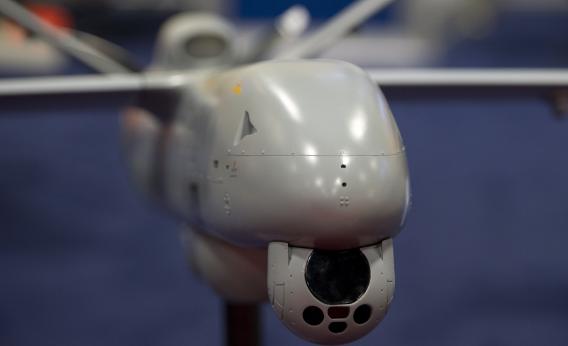Drone U Podcast: Can Drones Help Safeguard Human Rights?

Photo by SAUL LOEB/AFP/Getty Images
Every Wednesday on Future Tense, we will highlight a talk from a leading thinker from Drone U speaking on the topic of what our drone future may look like. Drone U is produced in cooperation with the New America Foundation. (Future Tense is a partnership of Slate, the New America Foundation, and Arizona State University.)
This week Drone U features Sentinel Project Executive Director Christopher Tuckwood speaking about using drones to protect human rights. Christopher sees this as a time of opportunity for applying new technology to the challenge of preventing mass atrocities, which is the focus of the Sentinel Project. Theories for predicting when and where mass atrocities will take place have been in place for many years, but only recently has the technology become available to gather the data needed to develop models for early warning that can help communities protect themselves.
Over the last 10 years, drones have gone from being the exclusive preserve of militaries and intelligence agencies to being available, relatively affordably, for commercial and nonprofit entities. There is also a growing talent pool of professionals and advanced hobbyists around the world that can be tapped into to help adapt this technology for socially beneficial uses. Anti-poaching applications have gained a lot of attention recently with Google providing millions of dollars to the World Wildlife Fund to help them use drones to protect endangered species. The Sentinel Project is betting that similar efforts can be undertaken to use drones to protect endangered people.
In fact, the biggest challenges for applying drone technology to human rights protection will probably not be the technical ones. Christopher notes that Sentinel Project staff consider what they call the "10/90 rule" whenever they work with a new technology. In designing programs the technology usually represents just 10 percent of the challenge, with the rest being social, ethical, logistical, and human behavioral challenges.
In the eyes of many people, drones remain a potent symbol of human rights abuses committed by governments around the world. In his podcast, Christopher lays out an intriguing alternative vision for how this cutting edge technology can be put in the hands of endangered communities to help them protect themselves against outside groups that seek to abuse them.
Join us on Sept. 11 for the next episode from Drone U, featuring David Kilcullen, CEO of Caerus Associates and author of The Accidental Guerrilla. He will be speaking about drones and counterinsurgency.
Future Tense is a partnership of Slate, New America, and Arizona State University.
